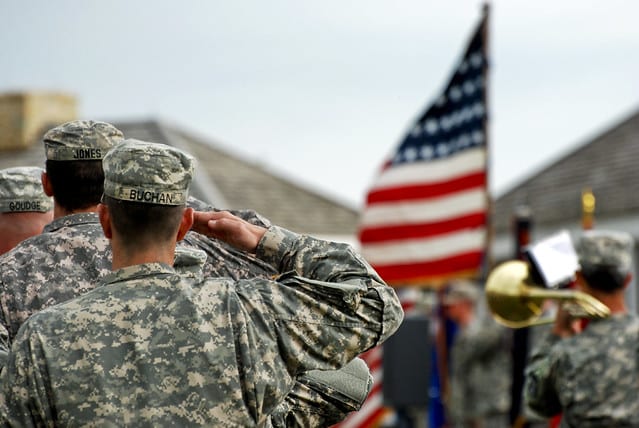Fewer than 100 members of the armed forces will be affected per year, but immigration lawyers say the move still poses worrying questions.
The Trump administration is restricting birthright citizenship for children of some U.S. servicepeople and government workers living abroad.
The policy alert was release by the U.S. Citizenship and Immigration Services on Wednesday. While contentious, the revision is expected to impact a relatively small number of Americans overseas. According to CNN, it ‘appears to primarily affect the children of naturalized US citizens serving in the armed forces who have not lived in the US for a required period of time.’ Only around 100 people, per the Defense Department, meet the criteria.
The rule will not affect anyone born in the United States. Instead, it means that the children of government employees who haven’t lived in the United States for more than five years will not automatically be conferred citizenship. However, they will still be eligible as long as their parents apply for citizenship on their behalf by their 18th birthday.
But the policy did lead to some evident confusion, with a handful of military and diplomatic groups quick to condemn the change and challenge its stipulations.
“Military members already have enough to deal with, and the last thing that they should have to do when stationed overseas is go through hoops to ensure their children are US citizens,” said Modern Military Association of America Executive Director Andy Blevins.

One Navy official told CNN that some military spouses are having “freakouts” online—and it’s no wonder, given the USCIS’ almost comically vague statements on the change.
“The policy change explains that we will not consider children who live abroad with their parents to be residing in the United States, even if their parents are US government employees or US service members stationed outside the United States,” USCIS wrote, “and as a result, these children will no longer be considered to have acquired citizenship automatically.”
The agency said the policy change could also affect the children of naturalized U.S. citizens who acquired citizenship after their child’s birth.
Immigration attorneys criticized the revision, with Martin Lester, chair of the American Immigration Lawyers Association’s Military Assistance Program, telling CNN there are enough “plausible scenarios” to foretell trouble.
“The fat that those of us who deal with immigration law all the time can read this memo and immediately point out plausible scenarios leads me to believe it’s going to impact some number of people,” Lester said. “Impacting one person is too many.”
The Trump administration, notes the Washington Post, has increasingly cracked down on immigrants—not just undocumented and in the United States, but in the military too. Under President Trump, the armed forces have “all but shutter[ed]” a program that recruited immigrants with critical medical training and in-demand language skills.
To counter the administration’s offensive, some immigration attorneys have cautioned soldiers. Margaret Wong, who practices in Cleveland, told the Post that the few citizen parents affected by the policy revision should come back to the United States before giving birth, just to be on the safe side.
Lester questioned how denying citizenship to soldiers and diplomats is aiding the country in any way whatsoever.
“I don’t understand how changing this policy makes America safer by telling its servicemen and women and its government employees that it’s going to make it harder for their children to be Americans,” he said. “Who possibly thought this was a good idea?”
Sources
Citizenship will no longer be automatic for children of some US military members living overseas


Join the conversation!